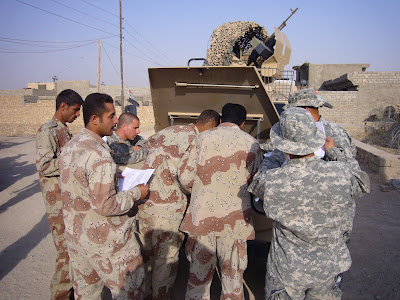"An Army marches on its Stomach" This famous quote is attributed to Napoleon Bonaparte, the famous Frenchman who recognized that logistics is often more important than tactics in winning a war. Perhaps the single greatest factor in the world-wide dominance of the United States Armed Forces is our ability to project our power across the globe. This would not be possible without our mature, robust and unprecedented logistics system. As a transportation officer, I have the ability to track a part from its production in a factory until it is delivered to the user on the battlefield, utilizing numerous computer systems and the world wide web. I have the ability to communicate directly with the operator of the vehicle which is carrying the part in case it needs to be diverted or is no longer needed. As a country, we have spent billions of dollars on technology and systems which enable us to get the right part to the right place at the right time. Some claim that "Amateurs study tactics, professionals study logistics." So, it is with great frustration and often disbelief that I have been exposed to "The Iraqi Logistics System." The motto of the Transportation Corps, corny as it may be is "Nothing happens until something moves" The motto of the Iraqi Logistics system could be "Nothing happens until some general in Baghdad says its o.k., but he's probably on leave, so you need to wait a week." I figure the most logical way to explain what we are dealing with is to cover the overarching problems which factor in to all logistical operations, then, in another post, I'll cover the "eaches" by going through each class of supply and explain our challenges. As the logistics adviser, I am directly responsible for developing and improving the logistics leaders in our IA Battalion. Thus far, it has taken me almost 4 months of being on the ground just to wrap my head around how things are supposed to work and how they are in fact working.
Maintenance Training at Cop Destroyer
- An Immature System: When we dismantled the Iraqi Army after the invasion, (against Bush's Orders...he thinks, its hard to remember) the entire Army was summarily dismissed. As we realized that we were facing an insurgency, and the Army would need to be rebuilt, we began by building from the smallest level. First squads, then platoons, then companies, battalions brigades and so on. The Ministry of Defense wasn't even an Idea. I have a colleague here who was a Tank Platoon Leader in OIF II, (we're now in OIF VI) who remembers as the ICDC (Iraqi Civil Defense Corps, a precursor to what is now the Iraqi Army) was being formed, he would be tasked to take Iraqi Security Forces on patrol with him, he would stop by their compound in his tank and pick up three or four, and they would ride out into the city with him on patrols. I tell this story to tell you this, for the first 3 years of Iraqi Security Forces, coalition units provided them with all of their logistics support. We bought their AK-47's, Pistols, and Ammo. We provided them with fuel, barriers, uniforms, everything. While this was effective in establishing them as a fighting force, it only contributed to their logistical dependence on Coalition Forces. Since then, its been an constant uphill battle. In each division there is a logistics company called the Motor Transport Regiment or MTR.
Destroyed Russian UAZ vehicles sit at Al Kisik
By design they are supposed to provide maintenance and transportation support to the three Brigades in the division. This unit has received its vehicles and theoretically should be capable of executing its mission. However, they have yet to complete a convoy to the National Depot in Taji, and are barely capable of getting even one truck to leave their post and deliver anything. Their maintenance company only last month submitted the list of parts that they need to stock, and they have yet to fix a single truck.
Russian Kroz Trucks at Al Kisik
- Centralized Control: In order for anything to get accomplished in the Iraqi Army, be it tactical operations, promotions, and is seems especially logistics, an Iraqi Officer must be ordered from higher. Initiative and innovation are not rewarded as they are in many cultures. This leads to huge headaches when trying to get supplies such as ammunition etc. Just a quick example which I'll probably reiterate when I discuss Class V: Here's the flow just to receive ammunition, keep in mind that there are millions of rounds in a warehouse not 30 minutes drive outside of Tal Afar where our Battalion operates. Also, IGFC (Iraqi Ground Forces Command) and MOD (Ministry of Defense), are located in Baghdad. A parallel system in the U.S. Army would involve a request for ammunition being approved by two bureaucracies within the Pentagon. Absolutely ridiculous, and the most frustrating part is that it is this way with nearly all supplies. I've attached a power point slide I created to brief my MiTT Team Chief on why our Battlion was struggling so much logistically.
Iraqi Ammunition Resupply Process
Next Time: Class I; Food Water and Ice


No comments:
Post a Comment